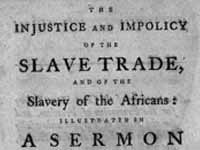 FREE METHODIST ROOTS IN JUSTICE ADVOCACY. Free Methodists formed a new communion in America in 1860 in affirmation of the freedom of all human beings (against slavery) and free access for the poor in houses of worship (against pew rents and pew sales); also, in affirmation of teaching Biblical holiness and practicing freedom in worship. My essay traces the roots of "doing justice" in the Bible, in early Methodism in England in the mid-1700s under the leadership of John Wesley, and in the priorities and practices of the early Free Methodists in America in the mid-1800's under the leadership of B. T. Roberts. I conclude the essay by citing barriers to and opportunities for "doing justice" in local Free Methodist congregations today. But you don't have to be a Free Methodist to imagine and begin to live justice through your faith!Here is a very brief excerpt:
FREE METHODIST ROOTS IN JUSTICE ADVOCACY. Free Methodists formed a new communion in America in 1860 in affirmation of the freedom of all human beings (against slavery) and free access for the poor in houses of worship (against pew rents and pew sales); also, in affirmation of teaching Biblical holiness and practicing freedom in worship. My essay traces the roots of "doing justice" in the Bible, in early Methodism in England in the mid-1700s under the leadership of John Wesley, and in the priorities and practices of the early Free Methodists in America in the mid-1800's under the leadership of B. T. Roberts. I conclude the essay by citing barriers to and opportunities for "doing justice" in local Free Methodist congregations today. But you don't have to be a Free Methodist to imagine and begin to live justice through your faith!Here is a very brief excerpt:'PRE-EMPTIVE JUSTICE?' Some will argue that today we, in fact, ‘do justice’ quite routinely. It is true that much could be made of preventive (dare I say ‘pre-emptive?’) work against injustice which vigorous inreach and outreach ministries of a local congregation offer. Who can adequately measure the redemptive care and positive spiritual formation impacts that Sunday School, Christian Life Clubs, addictions recovery, Bible study groups, cell groups, counseling, solid Biblical preaching, and compassionate outreach achieve in individual, family, congregational, and community lives? Daily and weekly, Free Methodists are calling people to live as salt and light in the world, equipping them to stand against temptation and evil, and forming them to be people who are not conformed to the world but who may well transform it. But all our positive, formative, preventive action does not reduce in the least the question of our action or inaction in the face of outright injustice in our community, society, and world.
DANGER: POLITICAL CO-OPTATION. Perhaps part of our conversation should focus on the kind of justice we Free Methodists are currently prone to do. It seems rather obvious that over the past 25 years, Free Methodist members and pastors have been and are involved in the struggle regarding abortion, the provision of positive alternatives for pregnant women, and other “culture war” issues related to public education, sexuality, bioethics, and court decision-making. On the one hand it appears that “culture war” issues have been framed and promoted completely outside Free Methodism, wed to partisan politics, and accepted by our members, pastors, and congregations. On the other hand it appears that historic concerns of Free Methodists and others have been co-opted and distorted by political influence groups. As far as I am concerned, the wedding of partisan-motivated issue advocacy to denominational identity should be resisted at all levels in Free Methodist ecclesiology and practice, both now and in the future. As we consider involvement in justice issues, we should be asking: who is initially and ultimately being served by these priorities and passions? Is the manner in which this issue is being approached and addressed reflective of the Spirit of holiness or the heritage in which we serve? And, are we thinking globally, or even beyond our own socio-economic group or consumer desires, when we vote or act?
MOVING TOWARD OUR ROOTS. One step further, let us ask: who is setting the social justice agenda? How are some issues deemed more important than others? It appears that current evangelical issues overlook and/or bypass core concerns that originally motivated Methodism and defined early Free Methodism: poverty, human slavery, and feminism. Let us ask ourselves: why has poverty and slavery, though these are the two gravest global issues, not even registered on the agenda of either major American political party in years? Why are we not alarmed at this? And what might we do in concert with other branches of the Body of Christ to focus on these global crises, even if national or Western political will regarding them is currently all but nonexistent?
Read the full document here.
No comments:
Post a Comment